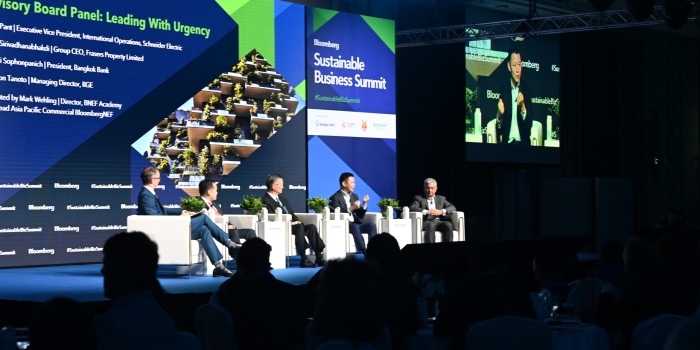Sustaining the Future of Palm Oil
A common ingredient in many products on supermarket shelves - ranging from food-related to personal care - palm oil is the most widely used vegetable oil in the world. It...

Latest updates on what's happening in RGE Group

The Bloomberg Sustainable Business Summit 2023 held on 26 July 2023 in Singapore attracted more than 500 physical attendees and close to 1,000 virtual participants. The international panel of speakers, business leaders and investors discussed how they can drive innovation and scale best practices in sustainable business and finance. The event was also attended by Singapore’s Minister for Sustainability and the Environment, Grace Fu.
RGE’s Managing Director Anderson Tanoto took part in a panel discussion titled “Leading With Urgency”, alongside Chartsiri Sophonpanich, President, Bangkok Bank; Panote Sirivadhanabhakdi, Group Chief Executive Officer, Frasers Property Limited; and Manish Pant, Executive Vice President, International Operations, Schneider Electric. Mark Wehling, Bloomberg Academy Director & Co-Head, APAC Commercial, BloombergNEF, moderated the discussion.
Anderson shared why going green is good for business, and the challenges he foresees as the world transitions to electrification and other sustainable energy sources.
Renewable energy and the supply chain in a net-zero world
One of the key topics discussed was the ongoing shift to electrification as an energy source. Anderson pointed out that by using electrification and digitisation as levers, we can do more, citing the positive impact that electrification can have on energy supply chains. An example is the construction of the Woodfibre LNG facility in Canada by Pacific Energy, a member of the RGE group of companies. The facility which will have an annual capacity of 2.1 million tons, will be using an electric-driven compressor instead of a gas-powered compressor. “This allows for a nine-fold reduction in emissions, and we offset the remainder with nature-based solutions,” he said.
He added: “Going green isn’t just about going green. It’s simply great for business.” Anderson highlighted RGE’s efforts to decarbonise by adopting solar energy. “Right now, the payback of going solar is less than six years, down from 12 or 13 a few years ago,” he said, reiterating the increasing imperative that businesses have in implementing green measures into their value chain.
However, he also urged business leaders to look beyond the part of the value chain they are in. He emphasised that: “Sustainability needs to be done as a whole supply chain – upstream, and all the way to consumers.”
As one of the world’s leading resource-based manufacturing groups, RGE has been at the forefront of building and implementing sustainable practices throughout its supply chain.
The competing roles of electric and biofuels in energy
However, electrification may not always work. Anderson went on to share some of the challenges he foresees in the near future. He cited the aviation industry as an example. “It will be maybe another 10,15, 20 years before you see planes flying on electric batteries, because of the weight,” he said. “And that’s where biofuels come in.”
There is an increasing regulatory push for sustainable aviation fuel (SAF) as a drop-in fuel, with Europe mandating a 2% blend starting in 2025, and a 1% increase every single year to 2030.
“What I like about biofuels is that they are readily available. The technology is there, and you can immediately implement and decarbonise existing machines,” he said. He highlighted RGE’s role in decarbonising the aviation industry, by utilising the large amounts of available agriculture waste and residue to produce sustainable aviation fuel. Mr Chartsiri Sophonpanich affirmed the usage of agriculture products in fuel production: “It also helps the farmers to be able to stabilise the prices of their products, which is good for them in the long term,” he said.
The importance of industry stakeholder collaboration
As the conversation shifted to how multiple industries can better decarbonise their operations, Manish Pant highlighted the need for collaboration among stakeholders. “If we are committed to net zero, we need to make sure that our suppliers are embarking on this journey as well,” he said. Panote Sirivadhanabhakdi, added that in order to succeed, stakeholders would need to have “the like-mindedness, and the alignment to sustainability”.
Underscoring the importance of collaboration, Anderson said: “To go fast, you go alone. To go far, you have to go together. But these days, we have to go far, and fast, together,” he said.
While some organisations may weigh in the risks and rewards when it comes to driving greener initiatives, he said: “To lead with urgency, we must form multiple collaborations, we have to invariably take some risks and move forward. Because not doing anything is definitely not an option.”
“As we transition to a greener world, there are going to be risks and trade-offs. There’s no perfect world out there. We just have to make decisions and move forward,” he concluded.